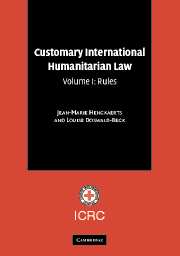Book contents
- Frontmatter
- Contents
- Foreword by ICRC President Jakob Kellenberger
- Foreword by Judge Abdul G. Koroma
- Foreword by Yves Sandoz
- Acknowledgements
- Introduction
- List of abbreviations
- Part I The Principle of Distinction
- Part II Specifically Protected Persons and Objects
- Part III Specific Methods of Warfare
- Part IV Weapons
- Part V Treatment of Civilians and Persons Hors De Combat
- Chapter 32 Fundamental Guarantees (Rules 87–105)
- Chapter 33 Combatants and Prisoner-of-War Status (Rules 106–108)
- Chapter 34 The Wounded, Sick and Shipwrecked (Rules 109–111)
- Chapter 35 The Dead (Rules 112–116)
- Chapter 36 Missing Persons (Rule 117)
- Chapter 37 Persons Deprived of Their Liberty (Rules 118–128)
- Chapter 38 Displacement and Displaced Persons (Rules 129–133)
- Chapter 39 Other Persons Afforded Specific Protection (Rules 134–138)
- Part VI Implementation
Chapter 33 - Combatants and Prisoner-of-War Status (Rules 106–108)
Published online by Cambridge University Press: 05 June 2012
- Frontmatter
- Contents
- Foreword by ICRC President Jakob Kellenberger
- Foreword by Judge Abdul G. Koroma
- Foreword by Yves Sandoz
- Acknowledgements
- Introduction
- List of abbreviations
- Part I The Principle of Distinction
- Part II Specifically Protected Persons and Objects
- Part III Specific Methods of Warfare
- Part IV Weapons
- Part V Treatment of Civilians and Persons Hors De Combat
- Chapter 32 Fundamental Guarantees (Rules 87–105)
- Chapter 33 Combatants and Prisoner-of-War Status (Rules 106–108)
- Chapter 34 The Wounded, Sick and Shipwrecked (Rules 109–111)
- Chapter 35 The Dead (Rules 112–116)
- Chapter 36 Missing Persons (Rule 117)
- Chapter 37 Persons Deprived of Their Liberty (Rules 118–128)
- Chapter 38 Displacement and Displaced Persons (Rules 129–133)
- Chapter 39 Other Persons Afforded Specific Protection (Rules 134–138)
- Part VI Implementation
Summary
Note: The implications of being recognised as a combatant in an international armed conflict are significant, as only combatants have the right to participate directly in hostilities (for a definition of combatants, see Rule 3). Upon capture, combatants entitled to prisoner-of-war status may neither be tried for their participation in the hostilities nor for acts that do not violate international humanitarian law. This is a long-standing rule of customary international humanitarian law. Treatment due to prisoners of war is spelled out in detail in the Third Geneva Convention.
Rule 106. Combatants must distinguish themselves from the civilian population while they are engaged in an attack or in a military operation preparatory to an attack. If they fail to do so, they do not have the right to prisoner-of-war status.
Practice
Volume II, Chapter 33, Section A.
Summary
State practice establishes this rule as a norm of customary international law applicable in international armed conflicts.
International armed conflicts
The requirement that combatants distinguish themselves from the civilian population is a long-standing rule of customary international law already recognised in the Brussels Declaration, the Oxford Manual and the Hague Regulations. It was subsequently codified in the Third Geneva Convention and Additional Protocol I.
Numerous military manuals specify that combatants must distinguish themselves from the civilian population. This includes the manuals of States not, or not at the time, party to Additional Protocol I. This obligation is also supported by a number of official statements and other practice.
- Type
- Chapter
- Information
- Customary International Humanitarian Law , pp. 384 - 395Publisher: Cambridge University PressPrint publication year: 2005



